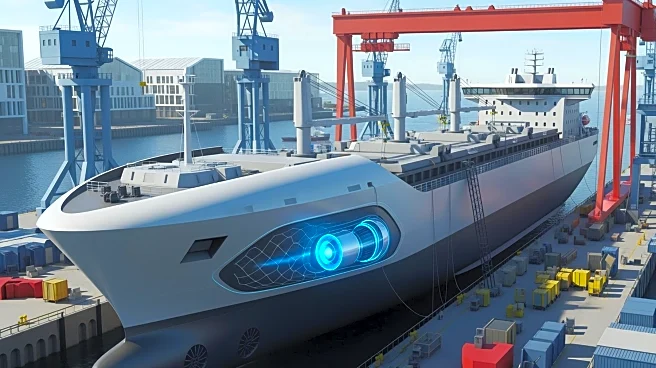What's Happening?
Concordia Damen has embarked on a significant refit project for the dry cargo vessel Hirschhorn, owned by Reederei Deymann, one of Germany's largest inland shipping companies. The vessel has arrived at Concordia Damen's yard in Werkendam, where the transformation
is underway. The refit includes a complete renewal of the aft ship, originally equipped with a single engine and propeller shaft, along with outdated living and wheelhouse arrangements. The new design will feature a twin-shaft propulsion system powered by two fuel-efficient diesel-electric 630 KWE engines. Additionally, the accommodation and wheelhouse will be rebuilt to improve comfort, ergonomics, visibility, and compliance with modern standards. This overhaul aims to extend the vessel's lifespan, enhance propulsion efficiency and reliability, and reduce fuel consumption and emissions, while enabling navigation in shallow waters.
Why It's Important?
The refit project undertaken by Concordia Damen is crucial for advancing the operational capabilities and environmental sustainability of Reederei Deymann's fleet. By upgrading the propulsion system and living arrangements, the vessel will achieve greater efficiency and reduced emissions, aligning with global maritime industry trends towards greener technologies. This transformation not only extends the vessel's operational life but also positions Reederei Deymann to meet stricter environmental regulations and improve competitiveness in the shipping industry. The project reflects a broader shift in the maritime sector towards modernization and sustainability, impacting industry standards and practices.
What's Next?
As the refit progresses, Concordia Damen will focus on completing the transformation to ensure the vessel meets all modern operational standards. The successful completion of this project could lead to further collaborations between Concordia Damen and Reederei Deymann, potentially influencing other shipping companies to adopt similar upgrades. Stakeholders in the maritime industry may observe the outcomes of this refit as a benchmark for future projects aimed at enhancing efficiency and sustainability. The refit could also prompt discussions on regulatory changes to encourage more environmentally friendly practices in shipbuilding and refitting.
Beyond the Headlines
This refit project highlights the ethical and environmental responsibilities of the shipping industry in reducing carbon footprints and improving operational standards. The adoption of fuel-efficient technologies and improved living conditions for crew members reflects a commitment to both environmental stewardship and human factors in maritime operations. Long-term, such initiatives could drive cultural shifts within the industry, emphasizing the importance of sustainable practices and worker welfare.















